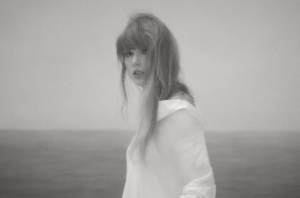The sweet, light fluidity of Kacey Musgraves’s croon has emerged to tell the tumultuous narrative of the years since her Grammy-winning Golden Hour (2018). star-crossed (2021) is a cohesive work, tackling heartbreak, healing, and hope in a package of fifteen songs. While Musgraves’s vocals shine as always through masterful production, the lyrics and tunes of similar-sounding ballads are not as enamoring as one might expect.
Lush with cinematic allusions (a fitting companion to star-crossed: the film), the titular first track is a choral welcome to a world of tragedy. “Let me set the scene,” beckons Musgraves with a drawl. Flourishes of harp accompany the picture that Musgraves tries to depict, of two people in love whose relationship took a turn for the worse. The slower, somewhat humdrum narration gives way to a surprisingly edgy pulsing synth. The specificity of divorce-related revelations (“signed the papers yesterday,” “gave you back your name”) turn into a pleading remembrance of pain, as humming and wailing vocalizations add to the epic tragedy Musgraves hopes to enact. The track itself is a bit nondescript but works heavily to act as an introduction to a celestial soundscape of Musgraves’s making.
“good wife” as a follow-up is a striking decision: As the launch into the real narrative, the song’s function as a prayer to be a helpful, supportive wife to her husband (now real-life ex) creates a focus for the listener and draws attention its priority. Perhaps the intimacy of the prayer and its literal correlation to her life are part of the reason why the song feels awkward. The song is much more situational than emotional, so it feels less enticing, especially for fans who are not so marriage-minded. The lyrics of “good wife” are entrenched in a ‘50s housewife scene: “And if he comes home stressed out, I could pack him a bowl / Just let him be himself, don’t try to control” and “Wake him up nice and slow / Bring him coffee in bed.”
Unfortunately, the song is not emotionally moving, and the husband-figure fades into an oblivious and entitled background actor. “good wife” lyrics rarely address their actual relationship, just that the singer is desperate to keep their crumbling relationship intact. The song plods along, mixed in with tense, pleading outbursts (“God help me be a good wife!”), but some production elements are worthy of appreciation, such as the backing la-da-das. However, the track probably reflects Musgraves’s mind at the time: nervous, yearning, yet subtly preparing for implosion.
“if this was a movie” and “angel,” two tracks that feel like one, sustain the same motif of wanting to save a failing relationship. The former features the sound of crunching gravel, evoking cinematic sound effects, before Musgraves theorizes about her relationship over gentle guitar strumming. Musgraves’s poetic prowess shows itself more fully here, “the stone in your pocket / Weighing you down,” but the lyrics are in tandem with a lilting melody that does not quite stick. The production of the siren echo and snappy drums is what steals the spotlight. Ultimately, the song ends on a flat statement, leaving something to be desired: “If this was a movie / But it’s not a movie.”
Likewise, “angel” begins with the phrase “if i was an angel,” repeating the “if” of the earlier track, not to mention the angel reference from “star-crossed.” Buoyed by imaginary scenarios and longings for different situations, the album definitely pushes its central themes—but inching toward doing so excessively. The lyrics simply express the same ideas she discusses on other tracks. Amid the surprising and pleasing presence of a thunderstorm rumbling in the background, she wishes, “I’d never have to change” and admits “But something’s gotta change,” both vague statements implying disconnect. The idea is straightforward and understated, and that is it. Imagination must return to reality eventually, and from there, not much else can be done.
Some tracks strike a sweeter note, working to reflect and embrace healing after hurt: “keep lookin’ up” tries to counteract the more somber notes of star-crossed with a forward-looking perspective. The song tries to embrace the listener in well-meaning advice, but the ideas put forth are recitations of clichés. Matching the old tropes is a steady, plodding beat, accompanied by guitar and snaps. The message morphs into something more poetic and satisfying when Musgraves turns inwards, grounding her experience with striking imagery of “fire burning in the sky / Things that I can’t explain / I’ve seen truth step into the light.”
“cherry blossom” and “simple times” deserve an honorable mention: upbeat and blissful, the tracks contain the pure appreciation for life that Musgraves can capture so well. Though the former contains relatively random references to Japanese culture, the song had a more bashful, hopeful tone, with an echoing horn and laidback beat. When the song picks up during its chorus, the playful acoustic guitar, keys, and drums add to the fun of the song.
“simple times” heightens the feel of a lazy, sunny day: bass and percussion melt together with glittering additions from the synthesizer to form a smooth track that praises a less confusing stage in life. However, once more she still maintains the already familiar what-if mentality—with a puzzling gaming metaphor: “Wish that I could put this game on pause / Skip this round take the headset off.” The lyrics feel almost juvenile compared to the lush relaxation of the track.
Many other tracks were hardly gripping, the songs blending together in a haze. “What doesn’t kill me” tries its best but falls a bit short with vague promises: hovering threats “You’re gonna feel me” and “Better run” lack oomph. “Hookup scene” tries to be moralizing. However, taking into consideration that she herself had to endeavor to find a solution to a troubled relationship that was right for her (yet culminated in separation), her admonition of “you might not even know that you don’t have it so bad” feels strange.
“camera roll” was the most tonally unsettling: technology-centric lyrics forced the song to feel unwieldy and alienating. Trying hard to be emotional and relatable, the melody and track just feel empty amongst lonely vocal meandering: “Chronological order” and “scroll too far back / That’s what you get,” she wails. The chorus feels empty, with Musgraves’s echoed vocals sing-talking, “I don’t wanna see ‘em / But I can’t delete ‘em.” The emotional pain of wanting to keep evidence of a happier time and proof of love versus the pain of loss could have been portrayed much more beautifully than through literal descriptions of an app, and only the last verse manages to handle the challenge.
The two best tracks displayed the same blend of feistiness and vulnerability that were so triumphant in Golden Hour. “breadwinner” contains fantastic wordplay and sass: Traipsing keys lull listeners into a scenario of a man whose charm overtakes you and says “he’s impressed with all your success / Tell you he’s different than all of the rest.” Musgraves blasts the object of the song and advertises a clear warning in a catchy, snappy chorus with guitar twangs and background bubbles. The message is clear—and in a devilishly fun form.
“justified” is the clear winner of star-crossed, managing to intertwine pain, determination, and empowerment in a proud, quick tempo and artful lyrics. “If I cry just a little and then laugh in the middle. . . Then I’m more than just a little justified,” she declares. The bass supports Musgraves’s pensive voice, while the percussion adds a punch to her bite. It’s only a sorrow that the rest of the album could not manage to stay on the same level.
The work came to a satisfactory end with “gracias a la vida,” sung entirely in Spanish and borrowed from the pen of Violetta Parra, an interesting departure from the rest of the album. The guitar and old film sound effect created another layer of storytelling, while the actual audio of voices resembled the end credits of a movie. The message did match the growth and healing narrative that Musgraves aimed to create, and the track acts like a lullaby, putting listeners at ease with the stars.
Ultimately, the album did not wildly surpass expectations, but the project was a nice enough listen. In the future the favorable effects of the work might grow, but for now, tension between liking the artist and feeling conflicted about their newest release is very present. The album does the work of highlighting Musgraves’s consistently gorgeous and effortless voice, and her voice does come through to share moments of uncertainty and pain along with hints of hope. But a lot of factors are not quite enrapturing, with so many tracks that are skippable and forgettable.
The artistry so present in previous works of hers is absent, and the overwhelming presence of slower ballads feels weighty. Engaging with the subject material might be the underlying cause of the distance for someone estranged from the sort of specific marital situation that Musgraves mentions so centrally, but the themes dangerously toe the line into redundancy, along with the many references to angels, dark and light, and film.
Viewing the album as a project that one might envision actively, repeatedly revisiting seems a bit unlikely. The Golden Hour hype is more than established, so while Musgraves’s experimentation and attempts at evolution are recognized and appreciated, star-crossed leaves mixed emotions in its wake. Trailing behind is a sense that Musgraves’s latest project might not fulfill listeners’ eager wishes of a soaring new installment in her discography.





